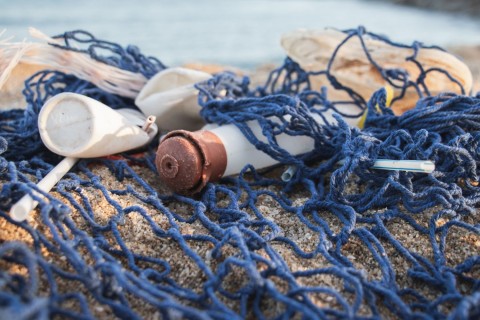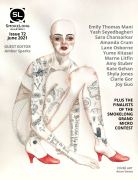When the great wave breaks over the little town, Junko is lying flat on her futon, and so it pulls her and the futon through the window and out to sea, along with a complete English tea set and a tin of biscuits that grandma never ate. The biscuits were too hard for her teeth.
In the ocean, a man sits on a roof that is no longer a roof. He is playing music on a record player as they drift around. He only has one record, so they listen to “Any Colour You Like” by Pink Floyd over and over again.
It rains, gently. There is a woman who had the fortune to be holding an umbrella when the wave came. The umbrella is dark blue and wavy white and matches the ocean not at all, despite what she says. She is very pleased with herself and lectures everyone else about not being more prepared.
Half of the town, in fact, is here, in the Pacific Ocean. An old woman calls over from where she is bobbing in the open drawer of her bureau to inform them that they may ride this current all the way to California. She used to teach geography and knows these things.
California! Junko’s aunt lives there, but she is not an actress, she is a farmer. Junko would like one day to be a musician or a painter. Or perhaps she’ll be a magician and produce sleepy white rabbits from top hats. She has never considered these possibilities before.
It is a long way to California.
In the meantime, they discuss the weather, because that is all they ever talked about anyway back home. It doesn’t matter at all what the weather actually is. If you do not have an opinion, and Junko doesn’t, you can alternate between saying it is good or it is too bad, isn’t it, that it is raining.
Junko eats the biscuits and thinks about her mama, who is back home cleaning up the wreckage that the tsunami left behind. When she gets to California, she will send her a postcard to let her know she is all right.
The air is warm, and Junko is sick of biscuits.
A woman sitting on a trunk is weeping, and she offers Junko her tears to drink in one of the cups from the English tea set. She is a good crier, which is nice, because Junko is thirsty. The woman is sad because her grandma’s kimono is not in the trunk she is sitting on, and it was a very pretty kimono. Her grief is the generous kind, and she shares her problems freely until a sea turtle comes and tows her away, and everyone is secretly relieved.
“When we get to California,” someone says. They are dreaming of new ways to end their stories, and because they are between one place and another, they can pretend that the way is open and all the doors in the world are unlocked. They are confessing desires they never spoke aloud in the confines of their little town by the cold open sea, because for a brief time, the disaster has brought them together in simulated intimacy. The old woman in the bureau drawer agrees to marry the man with the record player, but then the bureau and the roof drift apart again, and forever after, they can only look at each other from opposite sides of the floating village and think about what might have been.
Junko wraps her quilt around her shoulders and throws biscuit crumbs at the sharks. In this way, she becomes well-acquainted with them. One of the sharks is someone else’s mother. She wants to know why Junko is alone. She wants to take care of her. She offers her a choice: if Junko gives her a big toe, she will take her back home to where her mother is sweeping in front of the house. If she gives her a right thumb, she will take her to an island where she can live forever eating coconuts and reading all the thousands of books that ever washed ashore. Which does she prefer?
Toe or thumb? California?
She rubs her fingers against her toes and considers the pieces of herself she would give away for love. The salt of the ocean and the heat of the sun are turning her old and dry like a piece of squid. The great wave rocks her, and she is getting so very drowsy, she may just sleep, as it carries her towards the eternal promise of the future tense, of not ever having to choose, even when she runs out of stale biscuits.



 Included in the price of SmokeLong Fitness:
Included in the price of SmokeLong Fitness: